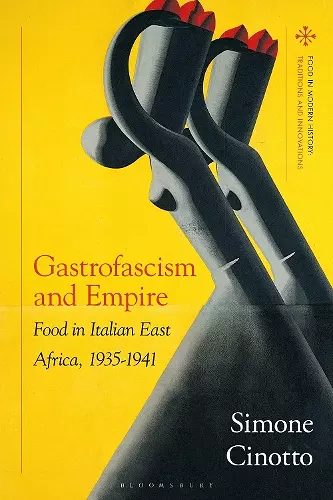Gastrofascism and Empire
Food in Italian East Africa, 1935-1941
Format:Hardback
Publisher:Bloomsbury Publishing PLC
Published:5th Sep '24
Currently unavailable, and unfortunately no date known when it will be back

This book examines the impact of food during the Italian occupation of Ethiopia, revealing the complexities of colonialism and cultural exchange. Gastrofascism and Empire offers a fresh perspective on these dynamics.
In Gastrofascism and Empire, the author delves into the intricate relationship between food and the Italian Empire's occupation of Ethiopia. The narrative explores how food served as a pivotal element in Mussolini's ambitions to establish an Italian presence in East Africa. The regime aimed to redirect surplus rural labor and envisioned transforming Ethiopia into a self-sufficient granary, which would bolster Italy's political standing. Although these grand plans ultimately failed, the cultural exchange between Ethiopian and Italian foodways thrived, leading to the emergence of a unique Ethiopian-Italian cuisine that reflects the complexities of colonialism and resistance.
The book breaks new ground in understanding the dynamics of empire through the lens of food, examining how foodways, bodies, and colonial practices intersected during this tumultuous period. By employing a decolonizing food studies approach, Gastrofascism and Empire sheds light on the lived experiences of both Ethiopian and Italian individuals. It moves beyond traditional colonizer/colonized narratives, offering a nuanced exploration of the emotions, agencies, and subjectivities tied to food within the imperial context.
Cinotto's work highlights the significance of food sovereignty in a landscape marked by racism and mass settler colonialism. The story told in Gastrofascism and Empire is distinct from other imperial narratives, revealing the unique challenges and adaptations that arose from the Italian occupation. This comprehensive study not only enriches our understanding of culinary hybridization but also emphasizes the vital role of indigenous foods in anticolonial resistance and the broader narrative of decolonization.
In this important book, Simone Cinotto portrays the intertwined gastronomic and racial fears and fantasies that inspired fascist Italy’s empire in Ethiopia. Despite attempts to segregate European and African foods and bodies, an ideal shared by contemporary nationalist politicians, a hybrid Italian-Ethiopian cuisine lives on in both countries. - Jeffrey Pilcher, Professor of Food Studies, University of Toronto, Canada
Gastrofascism and Empire is a brilliant and biting analysis of Fascist Italy’s bioimperialism and Italian East Africa’s resistance to the empire of food. Deconstructing one model of colonial gastronomy, Cinotto maps out the movement of people, practices of taste and disgust, and an indigenous attempt at food sovereignty. A new model in fascist studies. - Stanislao Pugliese, Professor of History, Hofstra University, USA
A compelling examination of the connections between food and Italian Fascist imperialism. Simone Cinotto offers a new lens on the history of occupied East Africa. He examines the devastating impact of Italian imperialism on East African food security, and how Fascist ideologies and practices of racism and autarchy influenced food politics. An original and welcome study. - Ruth Ben-Ghiat, Professor of History and Italian Studies, New York University, USA
ISBN: 9781350436831
Dimensions: 236mm x 160mm x 22mm
Weight: 631g
320 pages